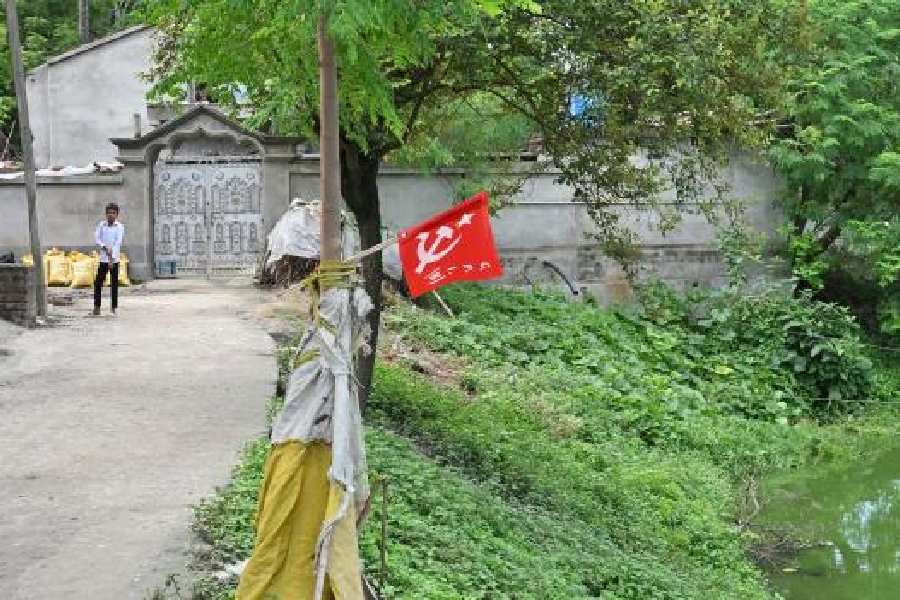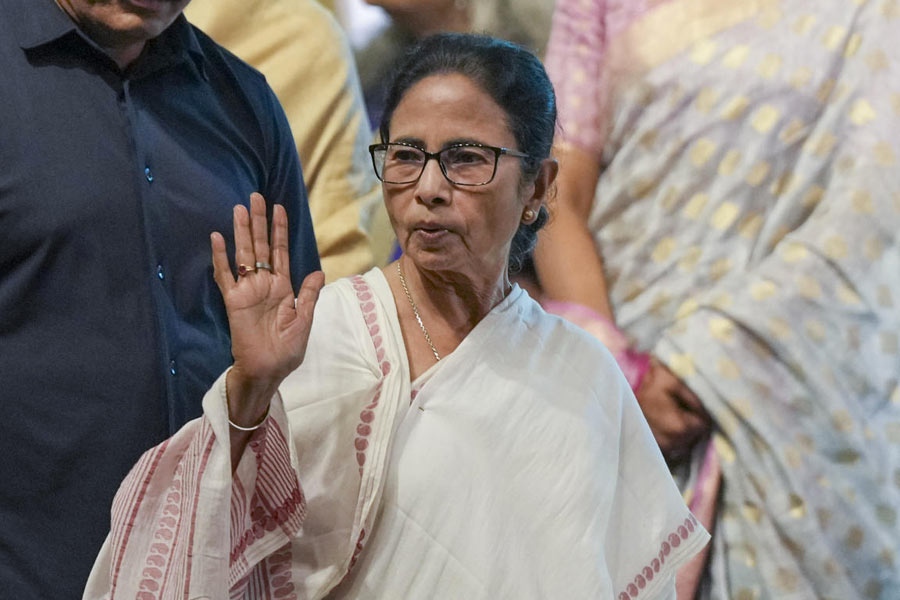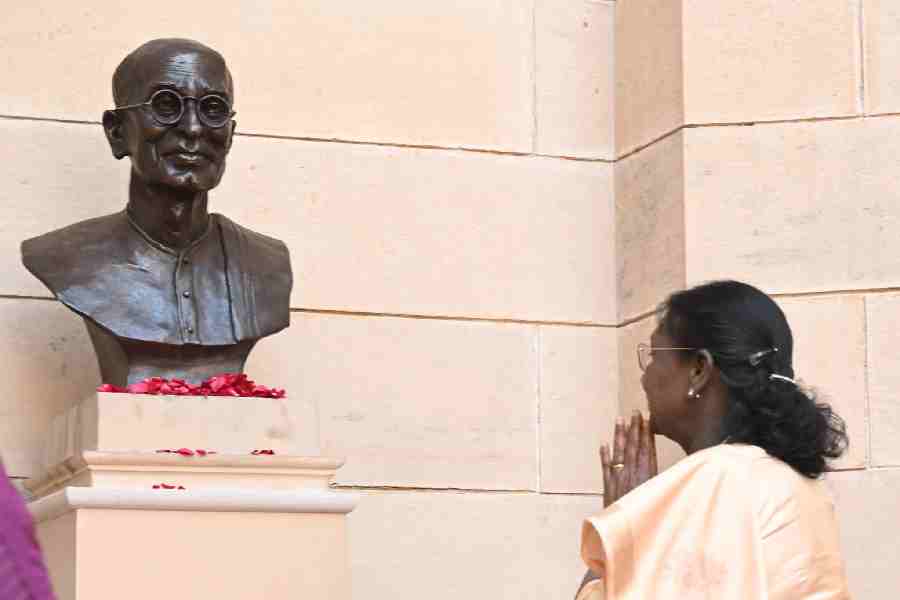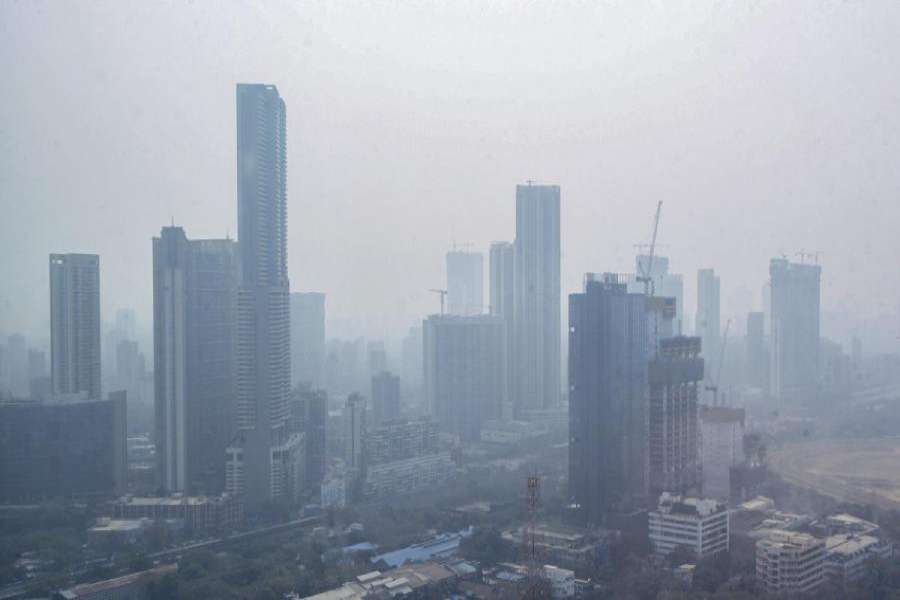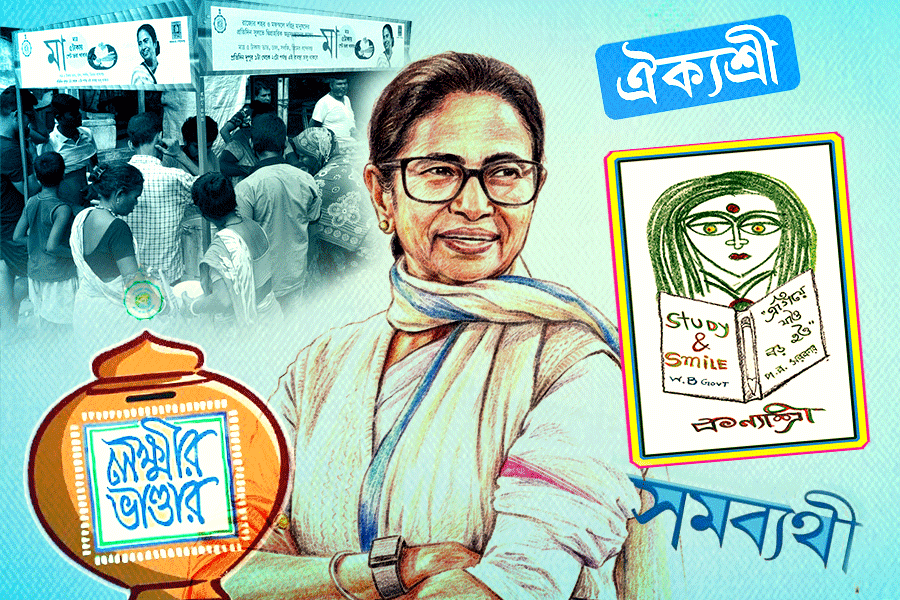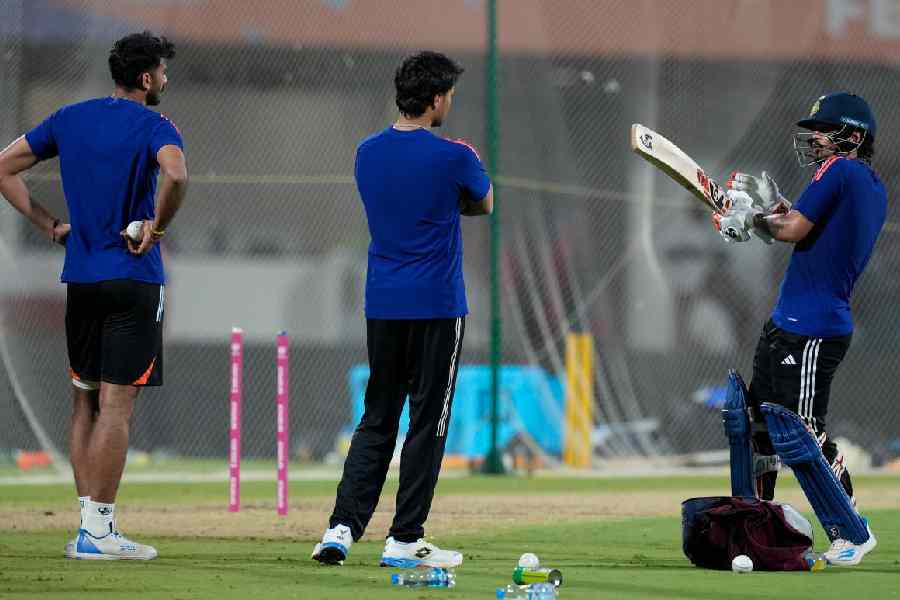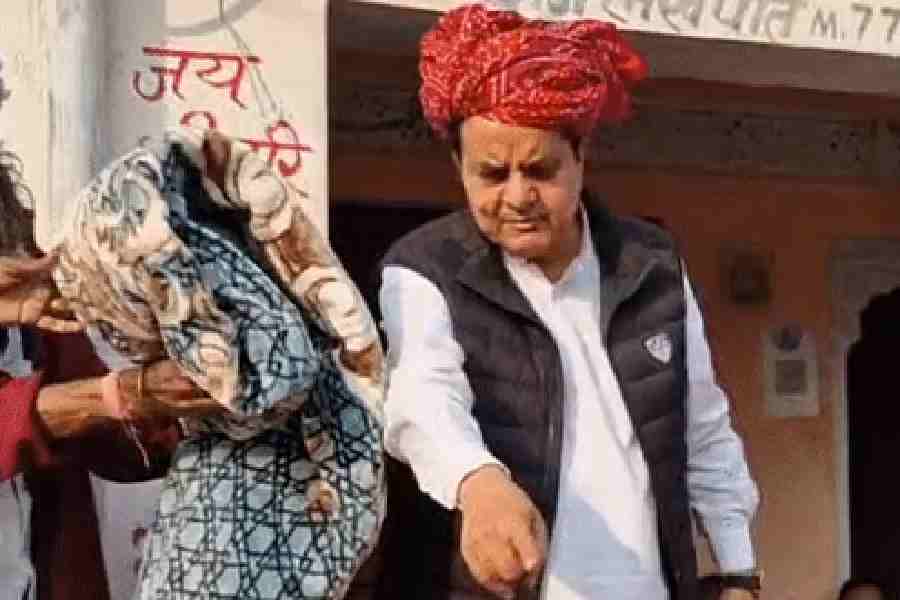The death of 10-year-old Tamanna Khatun in a “celebratory” bomb attack on June 23 has turned the spotlight on Molandi village, which is part of Nadia’s Kaliganj Assembly constituency that was won by Trinamool Congress’s Alifa Ahmed in a bypoll last month.
Class IV student Tamanna belonged to a family of CPM supporters, whose house was among those targeted with bombs by alleged Trinamool workers who began a violent celebration as news of Alifa’s lead over rivals came in on counting day.
But was the attack an isolated incident? Or did it reveal a more chilling truth that the murder was part of a violent political tradition that Molandi had been witnessing for several years?
The Telegraph visited the “terror zone” and spoke to villagers, political leaders and those in the administration to understand what turned Molandi into a region where bombs rule.
Migration as escape
Two years ago, 28-year-old Mosadul Sheikh left his Molandi home not just in search of work but to escape the pressure to join a criminal gang allegedly led by Trinamool booth president Gawal Sheikh and his brothers. “Mosadul is just one among several youths who have left the village under ‘gang pressure’,” said a villager.
Ahead of the June 19 bypoll in Kaliganj, Mosadul returned home from Odisha to vote and hope for change. But what greeted him instead was a chilling reminder of why he had fled — the brutal murder of Tamanna just a few steps from his house and a bomb attack on his own home.
“Four bombs were hurled at our house. One landed in the kitchen where my mother was cooking,” Mosadul said. “I was not at home then, but it’s a miracle that my mother survived”, he said.
But his neighbour Izarul Sheikh, 61, was not lucky. A bomb hurled at his home hit him in the eye, critically injuring Izarul. The elderly CPM supporter is under treatment and is praying to get his vision back.
Intimidation
At least a dozen homes of residents who support the CPM were attacked in Molandi on June 23. It was not the first instance of a bomb attack.
“Even in the past, bombs had been used to settle political rivalry. A gang under Gawal Sheikh rules the village. Their diktat is simple — surrender to their politics or face bombs,” said a resident, who was not willing to be named.
Among the villagers living in fear is 18-year-old Suhaib (name changed), a student preparing for his higher secondary exams.
“They tried to lure me with bombs and guns to join their gang and rule others,” he said. “I refused. Now I’m planning to move to Krishnanagar to study. It’s not possible to focus on education here anymore.”
As one moves through the narrow village lanes, the walls of several houses bear marks of bomb attacks. As people speak in hushed tones, it becomes evident that fear has become a part of Molandi residents.
A village of around 1,500 families in Baro-Chandghar gram panchayat, Molandi has been gripped by a reign of terror allegedly run by around 40 goons led by Gawal and his brothers — Anowar, Manowar, and Adar. Residents say they operate with the backing of local Trinamool leaders and Tamanna’s mother Sabina has named them among those responsible for the murder.
The grip of the Gawal family extends beyond politics. Villagers say the gang demands unconditional loyalty, threatens those who resist, and uses violence to control land deals, crop shares, public project funds, and even local healthcare access.
“It’s not just about politics anymore,” said a villager who requested anonymity. “It’s complete submission they want — total control over our lives. Even a boy’s marriage or a land sale can’t happen without their approval.”
The brutality of their rule was most painfully felt by Tamanna’s parents — Hossain Sheikh and Sabina Sheikh — who lost their only child to a bomb attack.
“Molandi has become a bed of bombs,” said Sabina. “Everyone knows that Gawal’s family hides explosives underground. The police know everything but do nothing to sanitise the village,” she told The Telegraph.
Farm hands to ‘goons’
Molandi’s political shift began after the fall of the Left Front in 2011, when several former Maoists, including Anowar Sheikh, joined Trinamool. Sources say Anowar’s brothers — Gawal, Manowar, and Adar — followed suit. Sons of a poor farmer, Zamir Sheikh, the four gradually established dominance in the area, changing the face of local politics.
“They brought in a violent culture rooted in their Maoist past,” said Jamshed Ali, a CPM supporter. “With the support of some senior Trinamool leaders, they built a parallel administration to destroy the Left’s hold here.”
The transformation of the Gawal Sheikh brothers was stark. Once landless labourers living in mud huts, they now own multistoried buildings, one of which local people claim serves as a bomb-making facility.
“People like Anowar were inducted into Trinamool to wipe out the CPM, but they eventually turned against the villagers,” a senior Trinamool leader said on the condition of anonymity.
Shrinking CPM
Although it has lost much of its support in the state, the CPM exists in Molandi, especially at all four polling booths in the panchayat. However, the rise of the Gawal Sheikh brothers, allegedly backed by former Trinamool MLA Nasiruddin Ahmed and Kaliganj block president Debabrata Mukherjee (alias Jhunu), tilted Molandi’s political power in favour of the ruling party.
“People switched sides not by will, but by fear,” said Nur Mohammed, the local CPM leader.
“The Gawal Sheikh brothers used guns and threats to seize control of land, with a section of the administration looking away.”
The gang’s influence reportedly spans land grabbing, extortion, and even interference in routine matters like crop sharing and property sales. “They collect money even when someone needs help taking a patient to the hospital,” said another resident, Jamshed Ali.
Suffering & resistance
For most villagers, protest is not an option. The threat of retaliation keeps them silent, but occasional resistance does happen.
Jamshed Ali said: “They even charge people for arranging hospital treatment using their political contacts. It’s extortion at every level. But a growing sense of frustration has begun to spark resistance. In 2022, a section of the working-class villagers aligned with the CPM and resisted. It culminated in a violent clash in 2023, where a senior Kaliganj police officer was injured.”
“We’ve reached a point of no return,” said a CPM supporter. “The gang of just 30 men has terrorised 5,000 people for years. We’ve decided to fight back now. The police are with them and we cannot seek their help. Our repeated pleas with cops have
gone unheard.”
Police plead for calm
After Tamanna’s death, local police reportedly urged CPM supporters not to retaliate.
“They begged us with folded hands to stay calm, assuring action. But if nothing is done, they’ll witness a different kind of uprising in Molandi,” warned a CPM leader.
Summing up the villagers’ anguish, Sabina said: “Molandi has become a bed of bombs. Everyone knows where the Gawal Sheikh family hides them. But the police are reluctant to recover those. They did not heed our past complaints. They appear to be waiting for the death of another Tamanna. My little girl was murdered to punish us for refusing to leave the CPM for Trinamool.”
Far away from Krishnanagar, Molandi has become a symbol of how a few dozen armed men have held over 1,500 families hostage under the nose of the police. Compelled by public pressure, the police have begun to act. It has recovered nearly 50 bombs from the vicinity of the houses of Gawal and his brothers.
“This is just the tip of the iceberg,” said a villager. The police, who are setting up an outpost in the village, said the search was on for bombs.
The police, however, lost the trust of most Molandi residents and a senior police officer’s description of Tamanna’s death as “accidental” has added to their anger.
The superintendent of police, Krishnanagar, Amarnath K, said: “Whenever any specific incident occurred, the police properly investigated the case and took measures, including arrests. So, I don’t think there is any reality behind such wild allegations.”
A police officer said Abdul Kashen Seikh, a relative of Gawal, was arrested on Friday for his alleged involvement in Tamanna’s murder. Ten people have been arrested so far in the case.
Trinamool silent
Trinamool leaders, including Kaliganj block president Debabrata Mukherjee (alias Jhunu), who is believed to be close to Gawal’s family, refused to comment on the allegations of helping goons terrorise the village in return for political favour. The support of Gawal and his ilk is important for Trinamool because Muslim-majority Molandi’s four polling booths have a strong CPM presence.
While Mukherjee preferred silence, Trinamool MP Mahua Moitra did not respond to a text message from The Telegraph for her comments. Alifa, who won the bypoll, did condemn Tamanna’s murder, but beyond that, she hasn’t spoken much.

